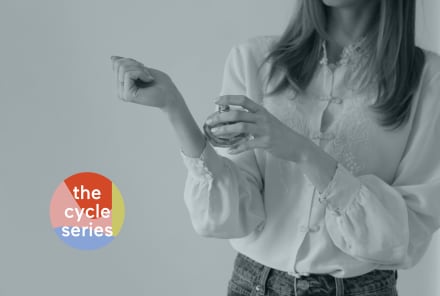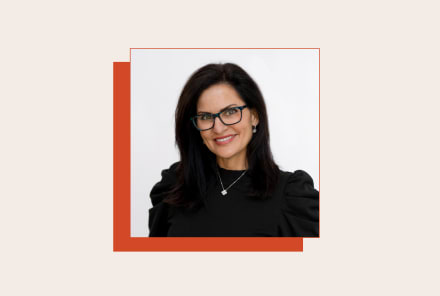Advertisement
How To Navigate The Addicting World Of Self-Help Consumerism, From Experts

Hannah Frye is the Assistant Beauty Editor at mindbodygreen. She has a B.S. in journalism and a minor in women’s, gender, and queer studies from California Polytechnic State University, San Luis Obispo. Hannah has written across lifestyle sections including health, wellness, sustainability, personal development, and more.

Self-help can be life-changing for some, even lifesaving for others. However, there's an underlying slippery slope and capitalistic aspect to the self-help world that, more often than not, gets overlooked entirely.
Especially around the New Year, the chase to quickly evolve into a whole new you can become engulfing, overstimulating, and even addicting. We asked experts about how to tell when your self-help journey stops being helpful at all and how to get back on track.
Can you be addicted to self-help?
While an "addiction" to self-help is obviously starkly different from other addictions, it still involves chasing a high of some sort.
This high generally comes up around the time you start a new habit, self-help book, or personal growth program. "There's an initial rush when we connect with something that seems like it can solve our problems," clinical psychologist Chloe Charmichael, Ph.D., explains.
From there, your brain begins to focus on a different, theoretical version of yourself, or what psychologists call your "aspirational self," Carmichael says. At first, this new habit might make you feel like you're finally doing it, evolving into your ideal self and closing the gap between who you've been and who you want to be. (Someone who is more organized, super fit, more loving in relationships, etc.)
When it doesn't quite work out that way, for whatever reason, you're likely left disappointed, feeling like you need yet another book or program to "fix" yourself. Then, you might immediately jump to your next goal without pause or reflection.
The hardest part of this self-help addiction is that, on the surface, it doesn't seem toxic at all—it even masks as beneficial.
But just like going from one fad diet to the next, quickly switching from one self-help journey to another manifests in extreme stress and even self-hatred, with little to no reward. What's more, the toxic mindset that once you fix that imperfect part of yourself, you'll be worthy of love and respect, makes you even more obsessed with finishing the journey so you can finally be worthy.
Why self-improvement sometimes requires disengaging.
There's immense societal pressure to continue to evolve at warp speed. But when you spend your days constantly absorbing new information about any given self-help topic without giving your brain a minute to reflect, it's easy to become overwhelmed.
Jor-El Caraballo, LMHC, a therapist who's seen self-help addiction firsthand, says that in these situations, it helps to remember that evolution doesn't need to always be guided by a book or paid program—it can, in fact, just happen.
By this logic, the best thing you can do for yourself in moments of overwhelm is to take a solid break. "There have been times when I say [to clients], 'I don't want you to read anything. I think you're working too hard. Just slow down and pay attention,'" Caraballo notes.
When you stop absorbing information, it gives you a minute to look inward and, quite frankly, be bored. "The important questions are there; the answers are there," Caraballo says of this space of silence. When you're less consumed with a certain goal and path, you may realize that you're actually better off going after something completely different.
How to approach self-help in a way that actually works.
Now to the good news: There's so much benefit to working on one aspect of yourself at a time, especially if it's something you've wanted to do for a while. And self-help isn't a lost cause just because you haven't seen any tangible progress, you're addicted to the chase, or you've never found a program that sticks.
The key is to engage in self-help in moderation and with intention and realism.
Set clear and personal intentions.
Rather than setting overarching goals based on what you think you should want, make your goals tangible and applicable to your life. As Caraballo explains, attaching your goal to something you truly care about will make it easier to navigate what will and won't work for you in regard to programs, books, etc.
If you want to get more fit but you've never cared about weight or numbers, then don't make your end goal a number. Instead, think about why you want to be fit, like having the stamina to play with your kids or feeling more confident in your body.
This step is essential because if you're not sure of your goal, you can't measure progress. "If you start something like meditation, for example, but never knew what you wanted out of it, then it can get really muddy," life coach and writer Alex Shea tells mbg.
When you've tried meditating for a week but don't see any "progress," then you might be tempted to quit and move on, for example. The problem, Shea explains, is that you didn't know what you were looking for in the first place.
If you're having trouble finding your why, confiding in a trusted friend, close family member, or a therapist can be immensely helpful.
Summary
Use moderation and split your self-help journey into phases.
Self-help doesn't have to be a full-time job. "There may be things you can always work on, but you don't always have to be working on them," Caraballo says. "You can start and stop or take breaks," he adds.
It's OK, and even beneficial, to have an era when you're consuming information and another era when you're simply observing. Swinging back and forth between the two will help you stay motivated, prevent burnout, and overcome the temptation to jump to a new goal right away.
What's more, "Research shows that people who cultivate an incrementalist mindset are much more successful in reaching their goals," Carmichael notes. Especially if you're taking a broad goal like eating healthier food or becoming a better partner, this will take more than a few weeks and one good book—so go into it knowing it will be a work in progress.
Self-help doesn’t have to be a full-time job.
If you want to try out a bunch of new things, there's a sustainable way to do that, too. "Limit yourself to one new idea or program a month," Carmichael suggests. If you see something you're excited about while you're on a different journey, add it to a list on your phone or in your journal.
Summary
Be realistic about what self-help tools can and can't do.
Finally, remember that books and programs are all just tools. Alone, a tool can't do any good. It's only when you know exactly why you're using it, and give yourself enough time to get comfortable with it, that a tool will pay off. And remember: You don't need to buy anything to start and finish a personal evolution journey. These tools are helpful, but they're not necessarily essential.
The takeaway.
In order to avoid self-help addiction, mental health experts agree that it's important to set personal goals (sticking to around one a month) and accept that growth can happen in moderation. If you find yourself jumping from one goal to the next without any personal progress, it can be helpful to see a therapist or confide in trusted loved ones as well. Most of all, remember that personal growth is not bought; it is made. You can use books and programs as tools, but real change always starts within.
Watch Next
Enjoy some of our favorite clips from classes
Enjoy some of our favorite clips from classes
What Is Meditation?
Mindfulness/Spirituality | Light Watkins
Box Breathing
Mindfulness/Spirituality | Gwen Dittmar
What Breathwork Can Address
Mindfulness/Spirituality | Gwen Dittmar
The 8 Limbs of Yoga - What is Asana?
Yoga | Caley Alyssa
Two Standing Postures to Open Up Tight Hips
Yoga | Caley Alyssa
How Plants Can Optimize Athletic Performance
Nutrition | Rich Roll
What to Eat Before a Workout
Nutrition | Rich Roll
How Ayurveda Helps Us Navigate Modern Life
Nutrition | Sahara Rose
Messages About Love & Relationships
Love & Relationships | Esther Perel
Love Languages
Love & Relationships | Esther Perel

















